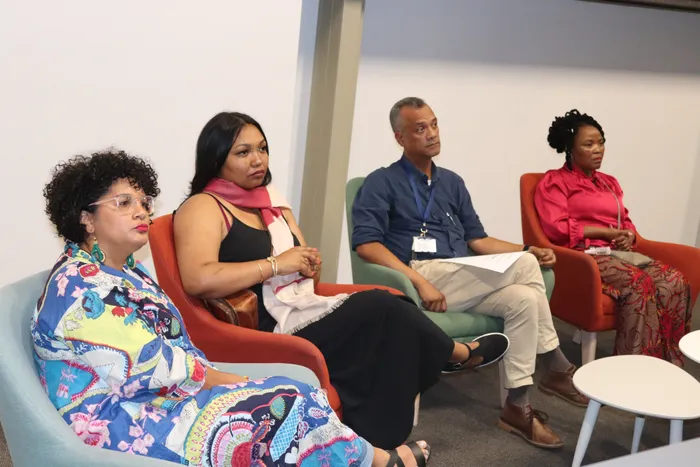Film looks at maternal care

From left, are Perinatal Mental Health Project service cordinator Liesl Hermanus, author Shana Fife, UCT senior lecturer Jason Marcus and Health and Wellness MEC Dr Nomafrench Mbombo.
A film produced to train maternity health-care workers to better support their patients was screened at the Neuroscience Institute at Groote Schuur Hospital last Thursday.
The Perinatal Mental Health Project (PMHP) held the screening, followed by a panel discussion, to mark the 16 Days of Activism for No Violence Against Women and Children Campaign. The PMHP is an independent initiative based at UCT that supports state agencies and works with non-profit organisations in support of mothers living in adversity.
Filmed at Mowbray Maternity Hospital, No Maternal Health Without Mental Health includes fictional scenes showing midwives discussing how they provide psychosocial support to patients, including the challenges they face and ways to improve care.
PMHP director associate professor Simone Honikman said many pregnant and birthing women experienced violence when at their most vulnerable ― at the hands of the health system.
“One in three South African women will experience depression and/or anxiety during pregnancy and in the year following birth,” she said.
After the screening, Professor Salome Maswime, an obstetrician and the head of global surgery at UCT, led a panel discussion with Health and Wellness MEC Dr Nomafrench Mbombo, UCT senior lecturer Jason Marcus, author Shana Fife and PMHP clinical services coordinator Liesl Hermanus.
Dr Mbombo said there would be no health services without health workers and, as such, they needed to be taken care of.
Mr Marcus said you could teach health-care workers all the technical skills they needed to save lives, but if they did not have the skills to manage themselves or recognise that they were not okay, it would not mean much.
“Our students are taught about health and human rights, and when they get to the labour wards, they are introduced to the compassionate birth project, which contributes to students being able to have compassion for themselves and, in turn, mothers and their babies. Our students are also taught professional humility by midwives and medical officers. Health-care workers also need to take accountability and be able to call out colleagues when they are behaving badly.”
Ms Fife described how her birthing experience had left her traumatised. She said she had been left without medication, postnatal care and food for about 24 hours after she had given birth. She believes that had she been shown a little bit of human dignity her experience could have been different.
“If someone had just come to check on me, even though I was not in a hospital bed, it would have helped. It truly is the small things that go a long way. Because of this, I have never gone back to a public hospital.”
Ms Hermanus has worked health care for 15 years and the last 12 of those in maternity care.
“It is in our work with our pregnant and postnatal clients, that we will learn and hear of examples of obstetric violence. One of our clients, who was a foreigner, shared with us how a midwife had verbally abused her because of the language barrier, and she was told to go back to her home. There was a disciplinary hearing, and the midwife had been moved from the labour ward.”
Ms Hermanus said that for someone to provide care, they needed to feel that they were cared for, and that could be as simple as showing appreciation to staff.

